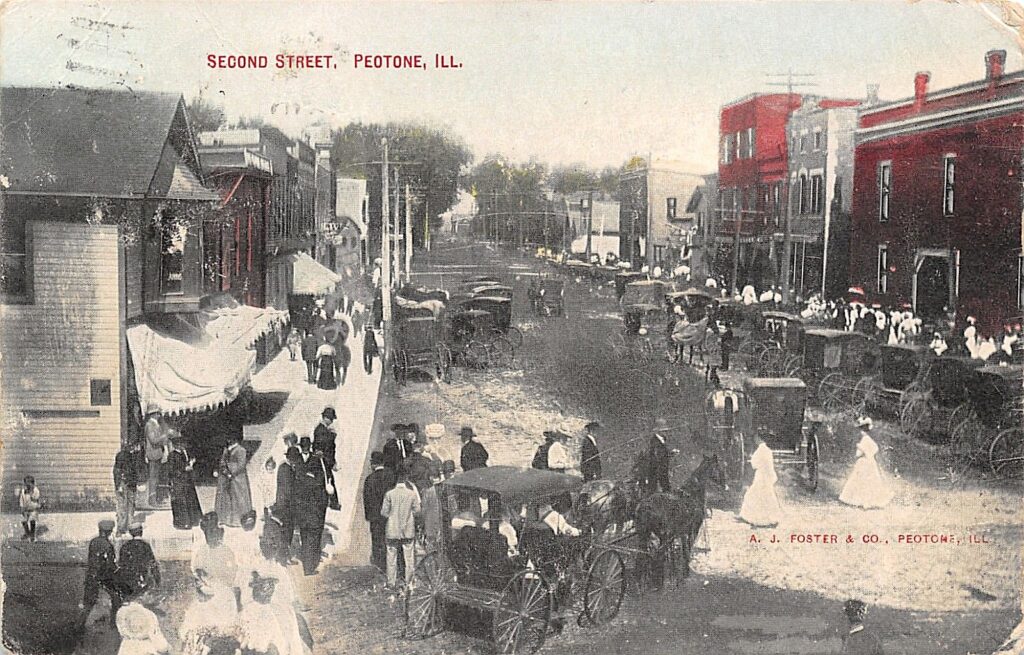Peotone, a much busier time … And no Tavern!

By Sandy Vasko
Today, we are headed south to the Village of Peotone. Peotone Township wasn’t settled until 1849, some 13 years after Will County was created. And the village only sprang up because of the railroad. It began as a shipping point for the agricultural products that the surrounding prairie produced.
We travel to January 1876, when the reporter for the Joliet Weekly Sun made a visit:
“Having had occasion to visit Peotone last week, the following sketch may not be unacceptable to the many readers of the SUN. My first impression of Peotone, and one
subsequently confirmed, was that its inhabitants were a thoroughly intelligent and progressive sort of people.
“With unexceptionable railway facilities, and with a situation in the midst of a beautiful rolling agricultural country, Peotone has every reason to be, as it is, one of the most flourishing towns on the Illinois Central. Situated within twelve miles of the cut-off road, its communication with the east could hardly be surpassed, while its shipments of produce are not rivaled by any town between itself and Champaign. As an instance of the magnitude of its operations, I may mention that the gentleman, J. I. Rice, Esq., shipped 1,200 tons of pressed hay to Chicago last year, and that nearly all of his own growing.
“Its hotels are numerous and well kept, especially those of Messrs. Dunning, or the Dunning House, and L. Fuller, of the Peotone House.
“With four churches, its spiritual wants should be well cared for. Prayer meetings are being held nightly at the Methodist and at one of the German churches. The Presbyterian church, under the able administration of the Rev. Mr. Wood, is in a very flourishing condition, financially and otherwise. Its members have this past year erected an excellent and commodious parsonage at a cost of $2,500. I attended a prayer and business meeting, and was much pleased with the spirit of unanimity which was prevalent among all.
“Professor Smith has the school under his charge. Unfortunately. I did not have time to pay him a visit, yet I am fully authorized in saying that Professor Smith is giving complete satisfaction, and is an able and accomplished teacher.
“Peotone does a large grain business, and has three elevators. This principal grain merchants are Raynes & Collins, and Warden & Gilkerson. The lumber trade is extensive. Imholtz & Conrad and Warden & Gilkerson, handle large quantities. The well-known Johnny Powis probably sells more agricultural machinery than any other man in the country.
“The principal stores are those of Schroeder & Co., Rathje, Harkins & Arnold Angus & Fell, Henry Gates, John Brayton, Harsh & Lewis, Frank Porter, Brayton & Kittenger, Miss Goodspeed, and Sollitt & Shumway.
“Dr. Shumway, although a young man, has already acquired an enviable reputation as an accomplished physician. Mr. Barnhart presides over the post office, and is in every respect an obliging and intelligent gentleman. Dr. Lyon, the dentist, is well known throughout the county as one of the most skillful of his profession.
“Peotone has the good fortune to be without one saloon, and I understand that the temperance party are steadily and surely progressing. Taking this last fact (and which many hold to be a very important one) in connection with the assured commercial prosperity of the place there can be few places in the state which present more attractions for business men than Peotone.”
That description of Peotone gives us the idea that all in town were angels, but one deadly sin got the best of William Schroeder.
From February 25, 1879 edition of the Joliet Signal: “Motion for a new trial was overruled in the case of William Schneider, recently convicted of malicious mischief before the circuit court, and his sentence, penitentiary for one year, was at once put into execution.
“The prisoner does not belong to the ordinary class of criminals. So much confidence had the sheriff in him, that he was allowed to take his way alone and unattended from the jail to the penitentiary. He delivered the mittimus from the sheriff to the receiving officer, who thereupon asked for the prisoner and was not a little astonished to learn that the prisoner brought his own order for incarceration, it being the first instance of the kind in the history of the penitentiary. “The case of Schneider is a lamentable example of what envy and malevolence will do for a man. He had been a resident of Peotone village for a lengthy period, and had amassed a fortune of $8,000 ($264,500) or $10,000 ($330,700) in carriage making and general machine business.
“John Powis became a successful competitor, opening with a large stock of eastern made buggies, and underselling Schneider. This raised the latter’s ire, who often made various threats against Powis, and as proved by the testimony, entered his establishment one evening, and wrought general ruin with the vehicles therein, cutting, marking and defacing them in an outrageous manner. In the blindness of his rage, he did not observe even ordinary precautions, and he fell into the hands of justice. At his trial, he was attended by his wife, a most estimable woman, and infant child. Notwithstanding the strong efforts of his attorneys in his behalf, he was convicted. Envy proved his ruin.”
Sandy Vasko is Director of the Will County Historical Museum & Research Center and President of the Will County Historical Society.